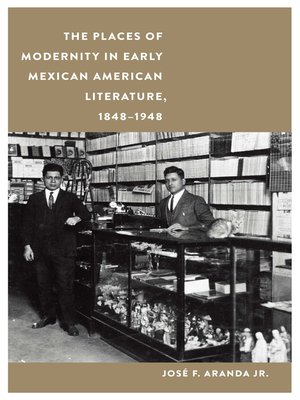The Places of Modernity in Early Mexican American Literature, 1848–1948
ebook ∣ Postwestern Horizons
By José F. Aranda

Sign up to save your library
With an OverDrive account, you can save your favorite libraries for at-a-glance information about availability. Find out more about OverDrive accounts.
Find this title in Libby, the library reading app by OverDrive.



Search for a digital library with this title
Title found at these libraries:
| Library Name | Distance |
|---|---|
| Loading... |
Named a 2023 Choice Outstanding Academic Title
In The Places of Modernity in Early Mexican American Literature, 1848–1948, José F. Aranda Jr. describes the first one hundred years of Mexican American literature. He argues for the importance of interrogating the concept of modernity in light of what has emerged as a canon of earlier pre-1968 Mexican American literature. In order to understand modernity for diverse communities of Mexican Americans, he contends, one must see it as an apprehension, both symbolic and material, of one settler colonial world order giving way to another more powerful colonialist but imperial vision of North America.
Letters, folklore, print culture, and literary production demonstrate how a new Anglo-American political imaginary revised and realigned centuries-old discourses on race, gender, class, religion, citizenship, power, and sovereignty. The "modern," Aranda argues, makes itself visible in cultural productions being foisted on a "conquered people," who were themselves beneficiaries of a notion of the modern that began in 1492. For Mexican Americans, modernity is less about any particular angst over global imperial designs or cultures of capitalism and more about becoming the subordinates of a nation-building project that ushers the United States into the twentieth century.
In The Places of Modernity in Early Mexican American Literature, 1848–1948, José F. Aranda Jr. describes the first one hundred years of Mexican American literature. He argues for the importance of interrogating the concept of modernity in light of what has emerged as a canon of earlier pre-1968 Mexican American literature. In order to understand modernity for diverse communities of Mexican Americans, he contends, one must see it as an apprehension, both symbolic and material, of one settler colonial world order giving way to another more powerful colonialist but imperial vision of North America.
Letters, folklore, print culture, and literary production demonstrate how a new Anglo-American political imaginary revised and realigned centuries-old discourses on race, gender, class, religion, citizenship, power, and sovereignty. The "modern," Aranda argues, makes itself visible in cultural productions being foisted on a "conquered people," who were themselves beneficiaries of a notion of the modern that began in 1492. For Mexican Americans, modernity is less about any particular angst over global imperial designs or cultures of capitalism and more about becoming the subordinates of a nation-building project that ushers the United States into the twentieth century.







